A language police and literary garbage removal squad.Painful protocol for a poet to swallow.The Academie Francaise was created by Cardinal Richelieu in 1635 as the official agency of linguistic formalism. It began as a reaction against female domination of the salons and against the ”precieuses”, a group of intellectual ladies who favored a style of speaking and writing based on circumlocutions, euphemisms, and fashionable words like ”furiously” and ”terribly” . Men of letters who shrank from referring to feet as ”the dear suffering ones” and to rain as ”the third element descending” , began to meet at the home of Valentin Contrart, a member of the species of non-writing writers. The atmosphere was that of an English club, informal and masculine.
In the beginning, Cardinal Richelieu felt there was something vaguely and suspiciously seditious about a society of men of letters who met on a regular basis without asking his permission.They had no statutes and intended no influence on public opinion. Richelieu offered his protection, which it was undiplomatic to refuse. Contrart and his friends were invited to draw up statutes and become the directors of ”a rich and pompous prytaneum of belles lettres” that would adopt the name Academie Francaise as ”the most modest and proper to its functions.” Literaries, thus found themselves as part of the cultural apparatus of government.A Civil service that grew out of the absolutist will to control and discipline language.
It became part of Royal doctrine and public policy that literature must be subservient to, and contribute to the grandeur of the state. Their task was to ”clean up the language and remove the garbage accumulated in the mouths of the common folk or in the magistrate’s courts or through the abuse of the men in the pulpits who say the right things in the wrong way.” There are forty seats, occupied by ”immortals” and an imaginary, unattributed forty-first seat, perhaps a forty-first seat of the pants.
Cardinal Richelieu’s concept was based on some emerging institutional forms of linguistic nationalism that involved the promotion of one’s national language as an important political concern; especially for the growing power of the nation state engaged in commerce and trade:”…which has eloquence as its central concept, theorizes language as a source of social and political power and as a vehicle for glorifying the deeds of statesmen. This model was originally revived by the humanists in the context of their belief that the Latin language had been badly degraded and corrupted since the fall of Rome. Emphasizing the power and glory that would accompany a return to Latin eloquence, they advocated a program of Latin revival. By the 16th century, poets and intellectuals who were immersed in Renaissance humanism, and who were oriented to the political problems of emerging European nation-states, began applying this model to the vernacular. Just as the earlier humanists were dismayed by the state of medieval Latin and worried that it could no longer offer a suitable medium for eloquent speech, the vernacular humanists were concerned that their languages remained too rude and barbarous to provide for eloquence. And just as the early humanists responded to this perceived crisis by embarking on an ambitious program of Latin revival and reform, the sixteenth century proponents of the national languages sought to make possible the power and glory associated with eloquence through a project of developing and imposing their own vernaculars. The early advocates of the vernacular saw in classical Rome the most successful example…In emphasizing the importance for politics of culture and language, they sought to apply this same model to the challenges of state-building facing their own societies.”
The Academie excluded women and retained a clubbiness; it was less interested in men of genius than in men of distinction.The first woman was not elected until 1980. The Academie never pretended to monopolize literary greatness, given the impressive list of writers it overlooked. The omissions included Descartes, Diderot, Beaumarchais, Rousseau, Balzac,Flaubert, Zola,Proust, Gide,Camus, Malraux and Sartre among others. Moliere was excluded because he was categorized as an actor, while the son of the minister Colbert was admitted by birthright. During Colbert’s acceptance speech, one member wrote, ” If to enter here, glory, genius, and the gist of creativity were required, the seats would be often vacant”. Refusal was almost a compliment.
The Academie remains a bastion of entrenched French values. A fortress that has survived natural disasters and the attrition of time, though it never manges to keep up with the times. The natural disaster was the revolution. The National Convention suppressed the Academie in 1793 as ”gangrened by an uncurable aristocracy” Its casualty list included three members guillotined and three others who committed suicide. It was not until the Napoleonic era that the Academie was revived and the membership renewed.
Napoleon, faithful to his mania for putting everyone in uniform, had the painter David design one of a bilious and pedagogic green and added a sword with a hilt richly worked with the symbols of the Empire. What has kept the Academie going, is simply that there are people, historically men, who desperately aspire to wear its uncomfortable cocked hat and spend their Thursday afternoons in the company of other ancients mulling over word definitions. Victor Hugo, a law unto himself, armed with the heavy cavalry of his wit, artillery of his metaphors,and outrageous flattery, repeatedly risked sarcasm and humiliation in his five attempts to obtain one of the forty seats and become an ”immortal” himself. Eventually the Academie succumbed to his siege.
There was, and is, something suspicious to the Academie about flamboyant talent and garish behavior. Baudelaire patiently visited the members, although the condemnation of ”Les Fleurs de Mal” as obscene was a heavy handicap.Also, it was not that Baudelaire took drugs, but it was his advetisement of his pastime that invoked a crusty refusal. Many members of the Academie were convinced Baudelaire was mad because he had been observed in the Louvre measuring the Greek centaur and muttering, ” There’s no getting around it, he can’t wipe himself”. Finally, Baudelaire withdrew his name and was advised not to try again.The visits that so afflicted Baudelaire are a form of final examination where the candidate must show his ability to adopt the tone of exquisite courtesy in which what is said has a contrapuntal relation to what is meant.In other words, the refined art of the insult, or back handed complmient.T
rotocol involved was so painful to Baudelaire that he contemplated suicide as an escape.It is likely America’s Beat Poets would also have received the fine art of French rebuke had they been invited to apply given their graphic and honest accounts about drugs and sex which could have been construed as ”advertising” under inspection: ” There he met Jack Kerouac and William Burroughs and they became friends. The three were eager to develop American writing not in an all-pervasive Hemingway style but along the lines of Walt Whitman, Herman Melville and Thomas Wolfe, the author of ‘Look Homeward Angel’, who died in 1938. The theory that they adopted was that it did not matter how much drink and drugs they took at night so long as they were at their desks in the morning. A lot of their influence came from the free jazz scene in New York. In 1948 Allen Ginsberg was arrested after some acquaintances had used his flat as a base for a robbery. He only escaped prison because his family committed him to a mental hospital. The headlines of the local paper read ‘Genius Columbia Student, Master of Crime Ring’. The insanity which he encountered in the asylum found it’s way into his first published poem ‘Howl’.”
The same special politeness of these patricians of the spirit, which damns while seeming to praise, is exercised in the speech given for new members.The reception speech is a tradition going back to 1640. At the reception of Maurice Jauron in 1967, a prolific author of treacly and simplistic historical novels, Louis Pasteur Vallery-Radot, referring to the suicide of Druon’s father said, ”too intransigent to live our life, he left this world voluntarily”
The Academie still considers itself a government agency and patriotic duties and offers memberships to those who have served the country well. In 1931, Paul Valery received Marechal Petain, the victor of Verdun, with a speech in which patriotism blurred common sense. ”You have made a great discovery. Such a discovery had to be made by nothing less than a man of genius…You have discovered this; that firepower kills…” Petain and two other immortals were later excluded from the Academie for Nazi collaboration.
The Academie’s function as the supreme court of linguistic litigation has declined. However, like other ancient institutions like the Roman Catholic Church, the Academie feels it must proceed with stately deliberation in matters of doctrine. Words are held up for weeks while their very nuance is examined and analyzed; any metaphysical positions are eradicated.In fact, writers of metaphysical material need not apply. Ralph Waldo Emerson, Carl Rogers and James Redfield would simply gum up the already sticky and protracted discussions. The clinical approach would exclude any of Emerson’s ” do not go where the path may lead, go instead where there is no path and leave a trail”, From the Academie’s meetings excerpts:” Brute-former definition: ”animal deprived of reason”, ”But all animals are deprived of reason. See Descartes-the theory of the animal machine”…”My dear colleague we are here to correct a dictionary, not to take metaphysical positons”…”The word brute, says Jean Cocteau, is used much more in reference to men than to animals. One says ‘that orreador is a brute.’ One does not say ‘that bull is a brute’ ”….”Because it is obvious! Let’s define brute as a creature deprived of reason, which covers both human brutes and animal brutes,” ”Ah! This time, my dear colleague, we are once again at the very heart of metaphysics…It is not the Academie’s role to take a position on such questions. Adjourned to the next meeting.”
If it all seems an exercise in futlity, the members of the Academie have no such doubts about themselves. Membership is still the pinnacle of an orthodox literary career. Like most of this type, often reactionary and a generation behind. An example is the 1965 tour of England with Gregory Corso and Allen Ginsberg, At New College, Corso’s poem ‘Bomb’ with the lines ‘O Bomb I love you, I want to kiss your clank, eat your boom…’ had provoked members of the college poetry society into hurling their shoes at the poets. W.H. Auden later defended Allen, observing that ‘Howl’ had much to say and that Allen Ginsberg ‘may well grow to even larger achievements’. And should one of the Beats influences who prefigured the movement, Henry Miller, be considered for an honorary forty-first seat at the table?:
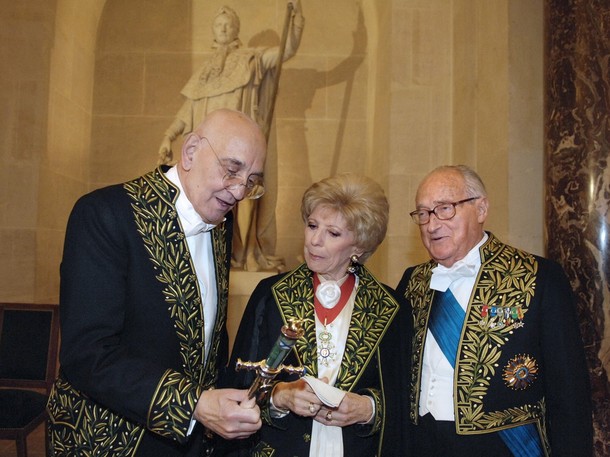
''French writer and new member of the Academie Francaise Max Gallo (L) shows his sword (traditionnaly given to members of the academy) to Academie members and French writers Helene Carrere d'Encausse (C) and Alain Decaux 31 January 2008 during his reception ceremony at the Academie Francaise in Paris.''
”With books like Tropic of Cancer, Tropic of Capricorn, and Black Spring, Miller created a new kind of writing – part autobiography, part philosophical treatise, and part a strangely American brand of street corner storytelling. In Miller’s worldview the human race had arrived at a point where it was no longer truly living life, but just existing, mistaking its own thoughts and fears for reality. And art, once the greatest expression of what it means to be human, had become little more than a decoration to conceal and soothe mankind’s epic failure. So, like a bull in a literary china shop, Miller let his writing loose as a kind of cure-all for this state. Or as he himself puts it in Tropic of Cancer’s opening pages:”A year ago, six months ago, I thought that I was an artist. I no longer think about it. I am. Everything that was literature has fallen from me. There are no more books to be written, thank God.”
The Academie has perpetuated a certain type of literary careerist who learns early how to tread water in the changing currents of polite society and win a seat on the right hand of a fashionable hostess thanks to a gift for flattery, a passion for conformity, and the knack of not making influential enemies. For every Sartre who would refuse it, if it were offered, there are a dozen Drurons longing to be fitted for the green uniform. ” Still, in some sense they are the last of the Mohicans… ”rather than sneer at its archaism, I marvel that what was originally a group of cultivated men trying to escape the preciousness of female salons has proven so durable….Examining the Academie is like finding in a forest teeming with many varieties of vegetable and animal life the last example of some species that had been thought extinct, its physical characteristics no longer suited to the changed environment, but in contradiction to the laws of nature, alive and healthy.”


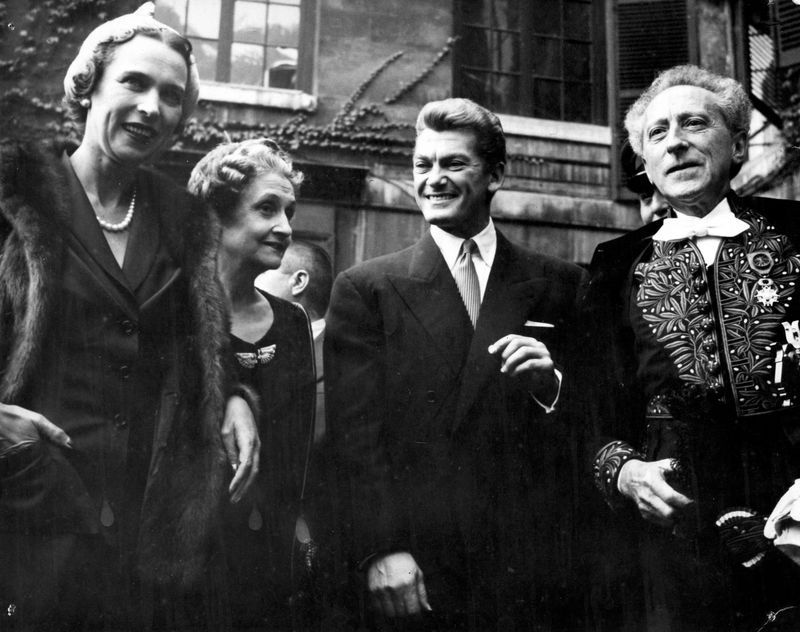
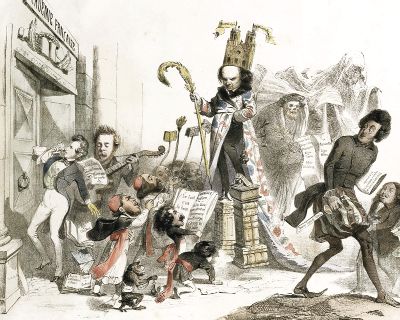
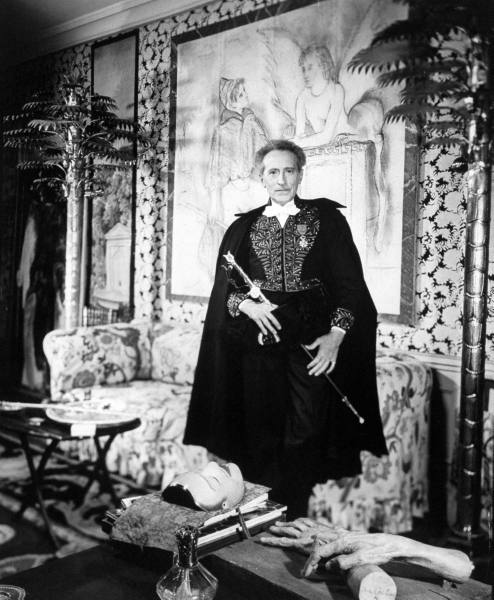
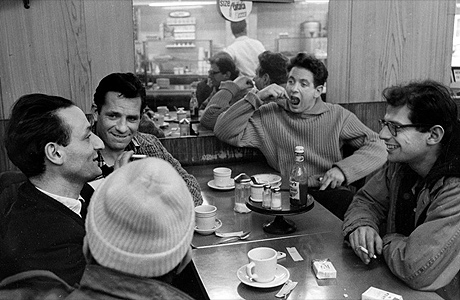
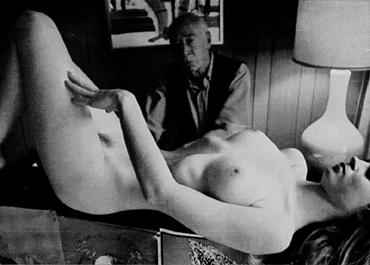



 COMMENTS
COMMENTS
Interesting piece. L’Académie Française has never been very forgiving. I’m writing my dissertation on Alfred de Vigny (contemporary of Baudelaire and Hugo), and it took several attempts to get elected (he finally was admitted in 1845).
One correction: Baudelaire’s famous poetry collection is titled Les Fleurs *du* Mal (instead of “de”). Minor error, but thought I’d point it out. His influence continues. I teach a course on the figure of the poète maudit/tortured poet, and we map the influences and universal themes present in texts from the 18th century to the present day. Baudelaire’s a BIG one… as is Rimbaud. The Beats, Jim Morrison, Dylan…
Thanks again for an interesting piece.
Living in Canada I should have picked that up! I will look at your blog. Yes, it seems to have its own form of institutional morality; it own institutional vernacular so to speak. I don’t know why Hugo was so determined to get in. I have been working on this issue of tortured creator as opposed to the Mozart vision, as a recurring theme over the past six months. Thanks for your comments and feel free to stay in touch.
Kudos from one braniac to another. :)